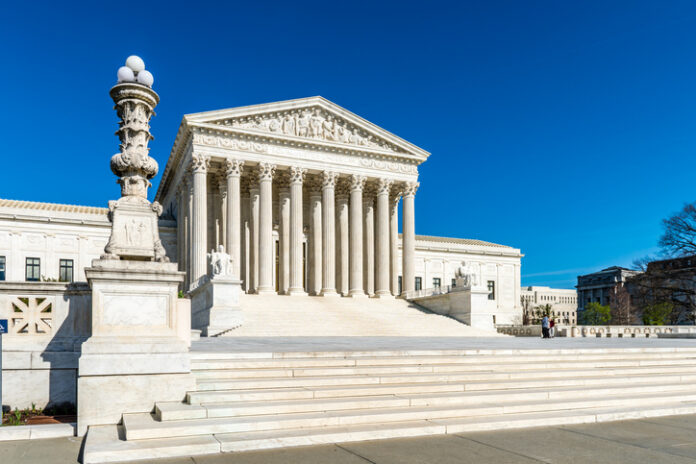The U.S. Supreme Court is considering a Montana education tax-credit case that could overturn provisions in many state constitutions barring the participation of religious schools in government programs.
In Espinoza v. Montana Department of Revenue, Kendra Espinoza and other parents are challenging a 2018 ruling by the Montana Supreme Court that the state’s tax credit scholarship program is unconstitutional because of a so-called Blaine amendment written into the state’s constitution. Blaine amendments barring “direct or indirect” state aid to religious schools were adopted by many states in the late nineteenth century. Currently, 37 states have Blaine provisions in their constitutions.
Montana’s program offered state income-tax credits to individuals or businesses contributing to scholarship organizations that pay tuition for students to attend schools chosen by their parents. Some parents used the program for private school tuition once the program was enacted in 2015. Espinoza wanted to use the scholarships for her daughters’ tuition at a Christian school.
Religious Discrimination?
A win for Espinoza could ensure the right of religious institutions to participate in scholarship programs across the nation, says Lennie Jarratt, project manager for the Center for Transforming Education at The Heartland Institute, which publishes School Reform News.
“The central point of the case is whether a state constitution provision that bans participation of religious schools in an education choice program is legal under the U.S. Constitution,” Jarratt said.
The Blaine provision of the Montana State Constitution violates rights protected by the U.S. Constitution, Richard Komer, a senior attorney at the Institute for Justice representing Espinoza, stated in oral arguments before the U.S. Supreme Court on January 22.
The “case asks whether the Federal Constitution allows the wholesale exclusion of religious schools from scholarship programs,” Komer said. “It does not. Yet, Montana’s Blaine Amendment requires that exclusion.”
Religious Schools Excluded
The Montana Supreme Court invalidated the entire tax credit program, which included participation by secular private schools as well as religious ones, to avoid discriminating solely against the religious schools, Komer says.
“The only reason the court invalidated the program was because it included religious schools,” Komer said. “Petitioners brought this lawsuit because they were denied scholarships based on religion, and they are still being denied scholarships based on religion. If the court had shut down the program because it included Muslim schools or African-American schools, there’s no question that would be unconstitutional.”
The First Amendment protection of the free exercise of religion outlaws government discrimination based on religion, David Hodges, an attorney with the Institute for Justice, told School Reform News.
“In this case, we asked the Court to affirm that the First Amendment requires government to be neutral toward religion,” Hodges said. “The government does not have to create scholarship programs like this one, but once it does, the program may not discriminate solely on the basis of religion. We were pleased to see that the Court seemed to be troubled by the fact that the Montana Supreme Court invalidated this program solely because of religion.”
Trinity Lutheran Precedent
In a 2017 case, Trinity Lutheran v. Comer, the U.S. Supreme Court ruled schools could not be excluded from government programs because of their religious affiliation. The Court could apply that ruling to this case, says Jarratt, or even expand its reach.
“The hope is that the Justices will follow up on the Trinity Lutheran ruling by overturning the Montana Supreme Court ruling that shut down the tax-credit scholarship program,” Jarratt said.
“The effects of the ruling depend on how narrow or broad it is,” Jarratt said. “At a minimum, this will reopen the scholarship program by ruling the Montana Blaine Amendment unconstitutional. A broader ruling could rule nearly all Blaine Amendments unconstitutional.
“The most likely scenario would be somewhere in the middle,” Jarratt said. “Either way, there will be more cases making their way to the U.S. Supreme Court in the coming years until a definitive answer on what is and is not religious discrimination in the states in the support of education.”
The Supreme Court is expected to announce its decision on Espinoza by the end of June.
Ashley Bateman (bateman.ae@googlemail.com) writes from Alexandria, Virginia.
Internet Info
Espinoza v. Montana Department of Revenue, U.S. Supreme Court, Docket No. 18-1195, January 22, 2020: https://www.heartland.org/publications-resources/publications/us-supreme-court-oral-arguments-in-espinoza-v-montana-department-of-revenue








